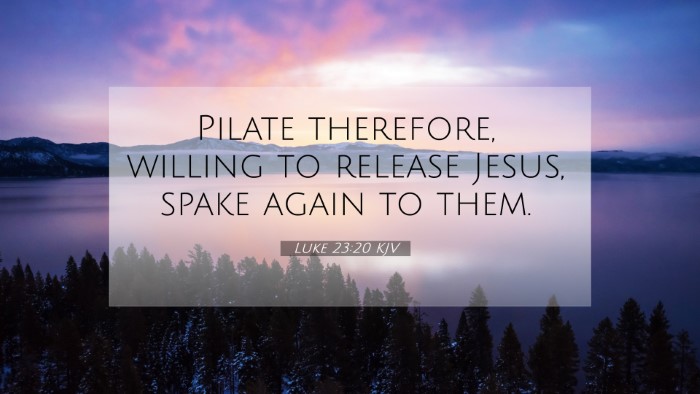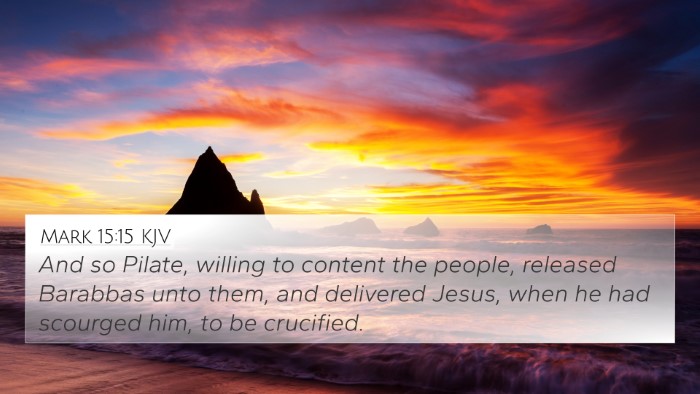Meaning and Interpretation of Luke 23:20
Verse: Luke 23:20 states, "Pilate therefore, willing to release Jesus, spoke again to them." This verse is significant in the context of the trial of Jesus, as it illustrates Pilate's struggle between justice and the pressure from the crowd.
Overview of the Context
This verse occurs during the trial of Jesus before Pontius Pilate, the Roman governor. The religious leaders of the time brought Jesus to Pilate, urging him to condemn Him to death. Despite finding no fault in Jesus, Pilate faced immense pressure from the crowd, and he was determined to find a way to release Jesus.
Commentary Insights
Insights from various public domain commentaries provide a deeper understanding of this passage:
- Matthew Henry: Henry emphasizes Pilate's internal conflict. Despite his desire to release Jesus, he was afraid to defy the crowd, which speaks volumes about the power of public opinion. Pilate’s desire reflects the grace of God striving to save mankind through Christ.
- Albert Barnes: Barnes elaborates on the implications of Pilate's willingness to release Jesus. He notes that this portrays God's sovereign hand in the unfolding events, ultimately leading to the crucifixion, which was part of God's plan for salvation.
- Adam Clarke: Clarke also points out that Pilate's indecisiveness is a cautionary tale about the dangers of yielding to mob mentality. He highlights that Pilate’s actions underscore the moral complexities in situations of authority and justice.
Bible Verse Cross-References
Luke 23:20 can be linked to several other Bible verses that enhance the understanding of its message:
- Matthew 27:24: Pilate's act of washing his hands as a sign of innocence.
- John 19:12: Pilate’s struggle with the religious leaders to release Jesus.
- Acts 3:14: Peter refers to Jesus being delivered up by the people, illustrating the collective role in His betrayal.
- Isaiah 53:7: A prophecy about how the Messiah would remain silent before His accusers.
- 1 Peter 2:23: Insights into Jesus’ demeanor during His trial as an example for believers.
- Luke 22:66-71: The trial of Jesus before the council, leading up to events in Luke 23.
- Mark 15:15: Parallel account revealing Pilate's intention versus the people's demands.
- Philippians 2:7-8: Reference to Jesus' humility and obedience unto death.
- Matthew 26:3-4: The plot amongst the religious leaders to arrest Jesus.
- John 18:28: The Jewish leaders bringing Jesus to Pilate, highlighting the transition from religious to civil authority.
Thematic Connections
This passage also connects with larger themes within the Bible:
- The Role of Authority: Pilate’s struggle with authority illustrates the tension between divine authority and human governance.
- The Concept of Innocence: Jesus’ purity in the face of false accusations relates to the overarching theme of righteousness throughout Scripture.
- Human Guilt and Redemption: Pilate's dilemma reflects humanity's guilt in the crucifixion of Christ, yet opens up the theme of redemption through His sacrifice.
- Moral Choices: The passage raises questions about making moral choices under societal pressure, relevant for modern audiences.
Conclusion
In summary, Luke 23:20 serves as a critical juncture in the narrative of the Passion of Christ. The various commentaries provide invaluable perspectives on Pilate's actions, the theological implications of Jesus’ trial, and illustrate the complexities of human choices in the face of divine purpose.
By examining this verse and its connections with other Scriptures, one can appreciate the rich tapestry of themes and messages woven throughout the Bible. The act of cross-referencing these passages can deepen one’s understanding of Scripture and reveal God’s overarching narrative of redemption.






